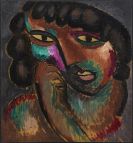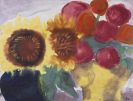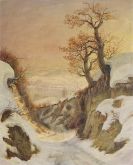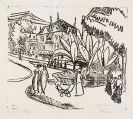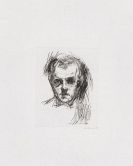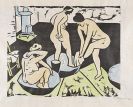
Adolf Erbslöh
New York
1881 -
Irschenhausen
1947
Adolf Erbslöh was born on May 27, 1881 in New York, where his father worked as a salesman. Some years later the family returned to Germany. After a six months' apprenticeship as salesman in 1901, Adolf Erbslöh registered for an art course at the academy in Karlsruhe. At the academy he met Alexander Kanold, with whom he entertained a life-long friendship.
In 1904 Erbslöh continued his studies under Ludwig von Herterich at the Munich academy. The decisive impetus for his future development as an artist was provided by his encounter with Alexej von Jawlensky. In 1909 the artist was secretary of the founding circle of the "Neue Künstlervereinigung München". This group of artists included Kandinsky, Jawlensky, Kanoldt, Münter, Werefkin and others, and formed the basis of the "Blauer Reiter" group. Their new artform is characterized by strictly styliyed representations. This characteristic is connected with intensive colors and an accentuation of the rhythmizised surface, which shows their close connection to Expressionism.
After having traveled to Italy, Erbslöh was dafted to the military in 1914, where he served as a war painter at the western front until the end of the war. In 1916 he joined the "Neue Sezession München".
During the 1920s Adolf Erbslöh traveled a lot. On his travels he produced numerous pictures of landscapes, continuously varying the mountain motif. From 1927 the painter spent most of his time at Lake Constance and in Upper Bavaria. In 1934 he bought a house in the Isar valley. In 1931, after a major retrospective at "Kunstverein Barmen", Adolf Erbslöh went quiet.
From 1933 it became impossible to take part in exhibitions or work in public. The artist lead a withdrawn life with his family in Irschenhausen. He painted numerous portraits of family members and friends, and depicted his immediate surroundings in small formats: his garden, his house, the church and the surrounding fields.
Many of his paintings remain unfinished and he signed hardly any of them. Irrespective of all trends, the artist is one of the most important exponents of Classical Modernism. His work reflects the furious developments in art during the first half of the 20th centruy without being arbitrary.
Would you like to sell a work by Adolf Erbslöh?
Infos for seller
